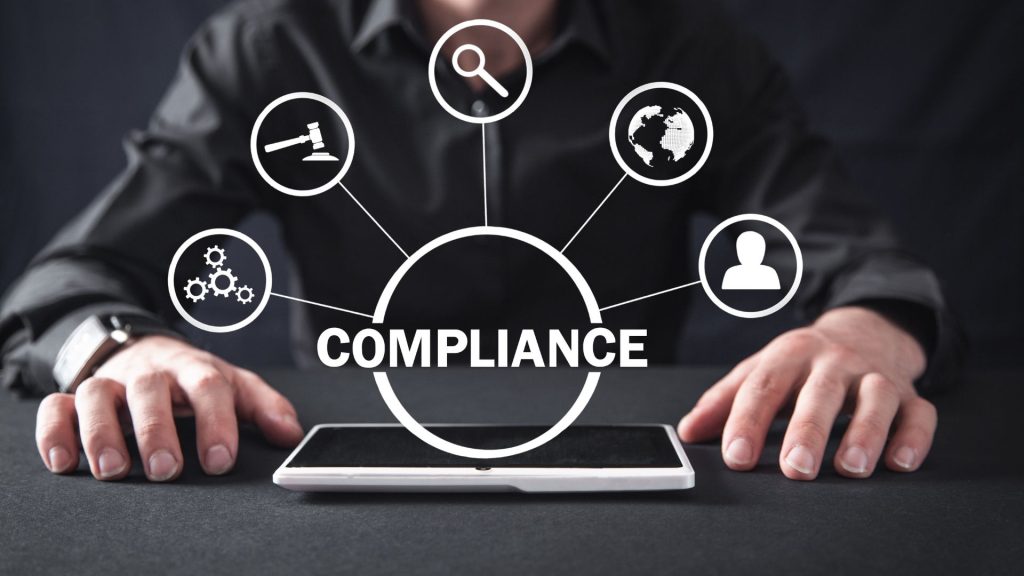A compliance officer is expected to have certain knowledge, skills, and responsibilities. Compliance is the observance of valid rules, regulations, laws, and standards within which this is achieved.
Corporate compliance functions started to emerge during the 20th century in response to big scandals in the USA. The scandals include procuring 400 US dollar-hammer and 600 US dollar-toilet seats in the Department of Defense. The US Sentencing Commission established the first Federal Sentencing Guidelines for Organizations in 1991, introducing the possibility of punishment that had “efficient” Compliance and Ethics Programs in place.
At the time, the offense was committed in response to increasing corporate scandals and inconsistent organizational punishment. This created positions for people whose job was to develop and implement compliance programs in organizations are compliance officers. With corporate scandals around the world, the compliance profession grew in importance.

Activities of Compliance Functions
The compliance function is an organization that ensures that applicable laws, regulations, and standards are timely identified, understood, and disseminated to the management for compliance.
The compliance function works as an advisor to the business and operations units to ensure that they correctly understand and apply the principles of regulatory requirements. The compliance function prevents the occurrence of big financial losses due to regulatory non-compliances and also damaged reputation. In a nutshell, the compliance function creates policies and processes that effectively:
● Prevent
● Detect
● Remove or resolve “unwanted events”
The compliance function ensures that insider trading activities are prohibited and fair processes are implemented to deal with customers. The compliance function monitors the transactions and activities of the customers to ensure that suspicious transactions are identified and reported to the regulatory authorities as per AML/CTF regulatory requirements.
The compliance function enables the employees to perform their day-to-day activities in compliance with applicable laws and regulations.
Activities and Obligations of a Compliance Officer
Compliance officers support the company’s Chief Compliance Officer in performing the compliance roles and responsibilities. The compliance officers work to prevent non-compliances and irregularities.
How do Compliance Officers Prevent Irregularities?
Compliance officers work to:
- Assess the compliance risk and implement compliance risk management measures. Compliance risk assessment is a starting point for planning annual compliance activities within a compliance program. As the resources that the compliance officer has available are limited, it is essential to identify where the risks are so that limited resources can be channeled in the best possible manner to achieve optimum results may be achieved.
- Define the compliance rules to ensure regulatory compliance and the incorporation of integrity principles into business activities.
- Educate, advise, inform and communicate. Understanding the rules and procedures of the employees is key to achieving harmonious conduct of the employees, and therefore, education is one of the compliance officer’s key activities. Compliance officers also advise employees in case of doubts or dilemmas and continually communicate values, rules, and relevant information to the employees.

How do Compliance Officers Remove or Resolve Irregularities?
Compliance officers remove or resolve irregularities by:
- Ensuring that individuals who violate regulations and rules are punished consistently. Although disciplinary action is the responsibility of management, the compliance officers must monitor how each case of irregularity ends and detect any inconsistencies in this process to avoid double standards in the implementation of disciplinary action.
- Ensuring errors do not reoccur through closing “loopholes” in the processes. When a particular problem or irregularity occurs due to a system defect, the compliance officer will direct the relevant departments to take corrective action and intervene in the relevant processes by clearly defining the responsibilities of stakeholders.
- Taking part in crisis management. The compliance officer must develop a crisis communication and management strategy.
The compliance officers detect irregularities by:
- Monitoring the compliance process and implementing second-level compliance controls
- Communicating with employees, direct or through irregular reporting channels
- Investigating irregularities
- Implementing compliance risk assessments, in addition to indicating the risks that the organization faces, risk assessment implementation can frequently uncover the existence of potential irregularities
- Conducting compliance audits
The compliance officers define annual plans and compliance activities to be implemented within the framework of the compliance program, to carry out activities systematically, and to plan the assets and time required for their implementation.
It is very important to understand that everybody in the organization is responsible for compliance with the regulations and rules. Still, not everybody in the organization can be responsible for the organization’s ethics and compliance program. Everybody in the organization should abide by the rules, report every violation of the rules, and implement concrete compliance activities within their domains of work. Still, the compliance officer is responsible for creating ethics & compliance programs and monitoring compliance of the organization and the employees with the established norms.
It is important to understand that the top management (CEO or board of directors) is responsible for the organization’s conduct.
The management manages the company and makes decisions related to the company. At the same time, the compliance officer advises the management concerning compliance, action in cases of identified irregularities, defining corrective action, education, communication with the public in case of reputation risk, etc. The compliance officer’s role is to provide all relevant information for decision-making to management, including risk assessment in the case of certain decisions. Still, the final decision is always made by management.
Compliance officers help the organization follow the established rules. Therefore, they need to have the support of the top management so that they can achieve the best possible results in their work of protecting the company from financial, reputational, and regulatory risks.

These are the basic preconditions required for adequate work of compliance officers:
- Appointment: A compliance officer should be appointed by the chief administrative body of the organization and answer to and has direct communication with the chief administrative body of the organization.
- Independence: A compliance officer must have a high level of independence in work to identify irregularities without fear of retribution or conflict of interest.
- Inclusion – Seat at the Table: A compliance officer must be familiar with all the organization’s regular activities to build an ethical culture advancing the general goals of the business.
- Empowerment: A compliance officer must be given sufficient authority to ensure that their decisions and recommendations are taken seriously and implemented or addressed at all levels of the organization.
- Resources: A compliance officer should have sufficient financial and human resources to effectively promote the standards, educate employees, and respond quickly to a potential rule violation.
Knowledge and Skills of Compliance Officers
The most important skills of a compliance officer include leadership, public speaking, writing, ethical decision-making, communications, and training.
From the tasks and duties of the compliance officer, it is evident what kind of knowledge and skills they need to have. The compliance officer needs many skills, especially active listening and reading comprehension.
The following skills are most important for compliance officers:
- Complex problem-solving skills
- Content (Science, Speaking, Writing, Active Listening, Reading Comprehension)
- Process (Monitoring, Learning Strategies, Active Learning, Critical Thinking)
- Resource Management Skills
- Social Skills (Negotiation, Social Perceptiveness, etc.)
- System skills
- Technical Skills
As all of the enumerated skills cannot be found in a single person, organizations form teams of professionals with diverse skills. The compliance officers’ social and organizational skills are critical to their roles. The organization may hire external compliance experts if specific technical knowledge or expertise is required.
Final Thoughts
A Compliance Officer performs several functions, including monitoring all operational processes and procedures with the help of a compliance management platform to ensure that the company complies with all legal regulations and ethical standards. Manages the flow of information by researching, recording, and analyzing data and information.








